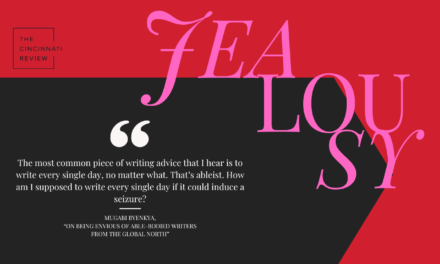
Associate Editor Connor Yeck: When we first encountered Nathan Dixon’s Thoughts & Prayers Inc.: A Play[gue], we understood it as something wholly singular. Here is a one act of surreal and uncanny atmosphere; a relentless excavation of gun violence’s social and political tragedy; a litany and dirge for the catastrophe unfolding at the national and bodily levels nearly every hour. Through its braided, interlocking voices—a Hallmark-card writer; a distraught mother; gun control advocate Jim Brady; the children of the United States—Dixon curates a transitory space where the unsayable is at last said and heard with unflinching clarity. The brittle figures of gun violence data become incantatory on a crowding stage, as do the many closing remarks of mass-produced sympathy notes (with caring, with you in sorrow, wishing you peace, my heart goes out to you). We’re incredibly honored at the CR to have the chance to host such a timely and haunting piece, and to ensure it reaches those most in need of its vision and voice.
Thoughts & Prayers Inc.: A Play[gue]
It feels as though we are one step shy of a rack of drug-store mass-murder sympathy cards.
—Ian Bogost
Characters:
KEELY CHANCE: A peppy go-getter, a Hallmark Master Writer who “loves reading, running, and spending time with her husband and daughters.” Her faith in the power of sympathy cards to help heal—to help make a real change—remains unshakable.
JAMES “JIM” SCOTT BRADY: In 1981, Brady—the White House press secretary—became permanently disabled from a gunshot wound during the attempted assassination of Ronald Reagan. His death in 2014 was ruled a homicide, caused by the gunshot wound he received thirty-three years earlier. Both the Brady Campaign to Prevent Gun Violence and the Brady Center to Prevent Gun Violence are affiliated American nonprofit organizations that advocate for gun control and against gun violence. Together, they are commonly referred to as the Brady Campaign.
MASH MOTHER: A concerned mother trying to make sense of a mass shooting at the high school she attended years earlier. She is afraid for her own children—slotted to attend this school in the near future—and feels compelled to send sympathy cards to the parents of victims from her alma mater. She simultaneously recognizes the futility of such action.
DEAR LIZA: A character from a children’s song (played by multiple girls, all wearing the same outfit).
DEAR HENRY: A character from a children’s song (played by multiple boys, all wearing the same outfit).
CHORUS OF CHILDREN: The collected Dear Lizas and Dear Henrys.
Setting:
There is no discernable character to the place in which the characters perform. Mash Mother cruises the internet. She might be at home, she might be at work, she might be at a coffee shop. She might be in her minivan or compact SUV, waiting to pick her children up from softball practice or ballet school. It does not matter. She is anywhere that someone might take out their laptop. Scenery should not clutter the stage. The audience cruises the internet with her. A screen behind the stage shows what Mash Mother views on her laptop.
Time:
It is dark.
Scene 1
(Blackout. The sound of gunfire rattles into the auditorium. Rat-a-tat-tat. Short bursts and single shots. Loud, then fading away from the stage. Coming closer again, an echo. In the middle of the stage, MASH MOTHER opens her laptop, and the gunfire stops. She sits on a stool flanked by KEELY CHANCE (on a shorter stool) and JIM BRADY (in a wheelchair). She scrunches toward her laptop, the digital glow lighting up her face. Behind her, headlines about mass shootings flash in jumbled time on a screen. Whenever KEELY CHANCE or JIM BRADY speaks, a light bulb blinks on above his or her head. Whenever he or she finishes speaking, the light bulb blinks off. ENTER Chorus of Children, from either side of the stage, to kneel in a line in front of Mash Mother, Keely Chance, and Brady.)
MASH MOTHER: I have a child.
CHORUS OF CHILDREN: We lose our children to the sea.
(One Dear Henry stands up.)
DEAR HENRY: The red tide washes over me.
(One Dear Liza stands up.)
DEAR LIZA: Pig-shit brown.
DEAR HENRY: Luminescent bloom.
(All of the children stand.)
CHORUS OF CHILDREN: Red algae feed on spilled lagoons.
(The children EXIT to either side of the stage.)
MASH MOTHER: (watching the children go) I have a child. I should do something. I have a child.
KEELY CHANCE: Signing a sympathy card isn’t easy. We search for words. We wonder what would be comforting to hear. We worry about saying the wrong thing.
CHORUS OF CHILDREN: (shouting from both sides of the stage) Or making too obvious your apathy.
BRADY: EVERY DAY, twenty-two children are shot in murders, assaults, suicides and suicide attempts, unintentional shootings, and police interventions.
MASH MOTHER: Always in the passive voice, isn’t it? Bodies become numbers. Agents become objects. Victims are shot. By actors. I should do something.
KEELY CHANCE: Even though it’s not easy, it is important to reach out in sympathy. Our words can’t take away the pain of losing a loved one, but they can go a long way toward helping a grieving person feel loved and supported.
BRADY: EVERY DAY, five children die from gun violence.
(ENTER Dear Liza, followed by Dear Henry.)
DEAR HENRY: (singing) There’s a hole in my noggin, Dear Liza, Dear Liza.
There’s a hole in my noggin, Dear Liza, a hole.
(EXIT Dear Henry, followed by Dear Liza.)
KEELY CHANCE: You should know right up front that you won’t find the perfect thing to write here.
BRADY: Three are murdered.
KEELY CHANCE: However, you will find ideas from seasoned Hallmark writers for good, helpful, and hopeful things to write in a sympathy card.
BRADY: Two either die from gun suicide or survive an attempt.
KEELY CHANCE: For those times when you can’t deliver one in person, Hallmark offers Sign and Send, which allows you to send a personalized, handwritten sympathy card from your phone or computer.
BRADY: One is killed unintentionally.
KEELY CHANCE: No matter how you send it, we hope our tips help you relax, write, and share your heartfelt caring with someone who is going through a time of grief.
BRADY: EVERY DAY, three hundred and twenty-one people of all ages in America are shot.
KEELY CHANCE: Condolences.
BRADY: EVERY DAY.
MASH MOTHER: Condolences. Are not enough.
(ENTER Dear Liza followed by Dear Henry.)
DEAR HENRY: There’s a hole in my noggin, Dear Liza, Dear Liza.
There’s a hole in my noggin, Dear Liza, a hole.
(At the end of each verse they switch directions and walk to the other side of the stage, the one who was following thus becoming the one followed.)
DEAR LIZA: Well, fix it, Dear Henry, Dear Henry, Dear Henry.
Well fix it, Dear Henry, Dear Henry, fix it.
DEAR HENRY: With what shall I fix it, Dear Liza, Dear Liza?
With what shall I fix it, Dear Liza, with what?
(EXIT Dear Liza followed by Dear Henry.)
KEELY CHANCE: There are many good reasons for keeping your personal sympathy message short.
(ENTER Chorus of Children from both sides of the stage.)
KEELY CHANCE: It could be that the card has already expressed most or all of what you wanted to say.
CHORUS OF CHILDREN: (shouting) Or maybe you didn’t want to say anything at all.
KEELY CHANCE: Or maybe you didn’t know the deceased well.
CHORUS OF CHILDREN: Or maybe you knew them too well.
MASH MOTHER: I guess . . . a card couldn’t hurt.
KEELY CHANCE: Whatever the reason, you can absolutely be brief and still come across as warm and caring.
BRADY: EVERY DAY.
CHORUS OF CHILDREN: EVERY DAY!
BRADY: One hundred and eleven people die from gun violence.
(EXIT Chorus of Children.)
KEELY CHANCE: “We are so sorry for your loss.”
BRADY: Forty-two are murdered.
KEELY CHANCE: “I’m going to miss her too.”
BRADY: Sixty-five die from gun suicide.
KEELY CHANCE: “I hope you feel surrounded by much love.”
BRADY: One is killed unintentionally.
KEELY CHANCE: “Sharing in your sadness as you remember Dan.”
BRADY: One is killed by legal intervention.
KEELY CHANCE: “Sending healing prayers and comforting hugs. I am so sorry for your loss.”
BRADY: One died but the intent was unknown.
KEELY CHANCE: “With deepest sympathy as you remember Robert.”
MASH MOTHER: A plague upon our house. A plague upon our country.
DEAR HENRY: (shouting from stage right) And the waters turned to blood.
DEAR LIZA: (shouting from stage left) And the waters turned to blood.
MASH MOTHER: I have a child. I have a child. I have a child.
KEELY CHANCE: If you knew the deceased but not the surviving family members to whom you’re sending your card, it might be helpful to mention your connection to their loved one (from college, through work, etc.).
BRADY: EVERY DAY, seventeen children are shot and survive.
(Enter Dear Liza followed by a string of Dear Henrys who are hounding her.)
DEAR HENRY I: There’s a hole in my belly, Dear Liza, Dear Liza.
DEAR HENRY II: There’s a hole in my elbow, Dear Liza, Dear Liza.
DEAR HENRY III: There’s a hole in my ankle, Dear Liza, Dear Liza.
DEAR HENRY IV: There’s a hole in my shoulder, Dear Liza, Dear Liza.
BRADY: EVERY DAY, two hundred and ten people of all ages are shot and survive.
(Dear Liza turns and stares down the Henrys, who bumble up against one another.)
DEAR LIZA: Then fix it.
(EXIT Dear Liza followed by the troupe of Dear Henrys.)
KEELY CHANCE: It can be a great comfort to a grieving person or family to hear that others thought highly of their loved one, too.
BRADY: In ONE YEAR, on average, of the one hundred seventeen thousand, three hundred and forty-five people who are shot, seven thousand, nine hundred and fifty-seven are American children.
(ENTER Chorus of children.)
One thousand, eight hundred and thirty-nine of those die.
(Chorus of children falls to the stage in a heap.)
MASH MOTHER: Bodies become numbers.
CHORUS OF CHILDREN: (whispering as they crawl to either side of the stage) become numbers, become numbers, become numbers, become numbers . . .
(EXIT Chorus of children, crawling.)
MASH MOTHER: No way to send a card to each and every one.
KEELY CHANCE: If you knew and admired the deceased, be sure to let your recipient(s) know.
BRADY: Every year, fifteen thousand, three hundred and forty-three Americans are murdered.
KEELY CHANCE: “I have the best memories of staying with Aunt Edie as a kid. I don’t think I’ve told you this, but starting when I was about ten, she would take me to Becker’s for ice cream cones . . . and let me drive! Only Aunt Edie . . . I’m going to miss her fun-loving spirit so much.”
BRADY: Twenty-three thousand, eight hundred and ninety-one die from suicide. Four hundred and ninety-two are killed unintentionally.
KEELY CHANCE: “Nobody could tell a funny story like your mom. Remember at your graduation party—the story about the vacuuming incident? My face hurt for a full day from laughing so much. I’ll always cherish those memories of fun times spent with her.”
BRADY: Five hundred and forty-seven are killed by legal intervention.
KEELY CHANCE: “Your daughter touched so many lives for the good. I’m grateful I had the chance to know her as both a colleague and a cherished friend.”
BRADY: Three hundred and forty-seven die but the intent was unknown.
MASH MOTHER: Unknown? And who will send a card to them?
KEELY CHANCE: Need a more specific word than “good” to describe the deceased? Consider one of these: kindhearted, talented, admired . . .
MASH MOTHER: Lamented?
KEELY CHANCE: . . . unforgettable, fun-loving, funny, wonderful, well-loved . . .
MASH MOTHER: Departed?
KEELY CHANCE: . . . lovely, sweet, generous, one-of-a-kind . . .
MASH MOTHER: Redundant?
KEELY CHANCE: . . . one in a million, honorable, respected . . .
MASH MOTHER: Erased?
KEELY CHANCE: . . . caring, hardworking, strong, energetic . . .
MASH MOTHER: Dead?
KEELY CHANCE: . . . happy.
MASH MOTHER: Dead.
BRADY: In America, one out of three homes with kids have guns, and nearly four point six million children live in a home with loaded and unsecured guns.
(Enter Dear Liza Followed by Dear Henry.)
DEAR HENRY: With what shall I fix it, Dear Liza, Dear Liza?
With what shall I fix it, Dear Liza, with what?
KEELY CHANCE: Offer to help.
DEAR LIZA: With a straw, Dear Henry, Dear Henry, Dear Henry,
With a straw, Dear Henry, Dear Henry, a straw.
BRADY: Talking to children about the dangers of firearms is not enough.
DEAR HENRY: But the straw is too long, Dear Liza, Dear Liza.
(Dear Liza stops pacing and turns to face Dear Henry. She no longer sings the words but spits them—flat—back into Henry’s face.)
DEAR LIZA: Then cut it.
DEAR HENRY: (continuing to sing his words) With what shall I cut it?
DEAR LIZA: An axe.
DEAR HENRY: But the axe is too dull.
DEAR LIZA: Then hone it.
DEAR HENRY: On what shall I hone it?
DEAR LIZA: A stone.
DEAR HENRY: But the stone is too dry.
DEAR LIZA: Then wet it.
DEAR HENRY: With what shall I wet it?
DEAR LIZA: Try water.
DEAR HENRY: In what shall I fetch it?
DEAR LIZA: A bucket.
DEAR HENRY: (taking a deep breath, then happily belting out the words to the song) There’s a hole in the bucket, Dear Liza, Dear Liza.
CHORUS OF CHILDREN: (shouting from stage right) And the waters turned to blood.
CHORUS OF CHILDREN: (shouting from stage left) And the waters turned to blood.
(EXIT Dear Liza and Dear Henry.)
KEELY CHANCE: If you’re in a position to help your recipient with arrangements, meals, housework, yardwork, childcare or something else, then feel free to include an offer to do so as part of your message. Just be sure to follow up and follow through.
MASH MOTHER: A plague, a disease, a lagoon of pig shit. Brown numbers bubbling in the murk. I have a child. Forget follow-up. Who will remember her name? Forget follow-through. We need prevention. I have a child.
KEELY CHANCE: In general, the more specific your offer of help, the better. And no task is too small.
MASH MOTHER: There’s blood in the water.
BRADY: Take action.
KEELY CHANCE: Offer ongoing messages of support. Follow Up.
MASH MOTHER: Plug the bucket. Prevent the problem. My daughter goes to school, to the movies, to the mall.
KEELY CHANCE: You can send these cards to note an occasion like the deceased’s birthday, a wedding anniversary, holidays, or any other time when the grieving person may need extra support.
BRADY: Access to a gun in the home increases the risk of death by suicide three hundred percent. Americans kill each other with guns at twenty-five times the rate of other high-income countries. One hundred and fifty-five percent more people are shot in incidents where assault weapons are used. Ninety percent of guns used in crimes come from five percent of gun dealers. Ninety-seven percent of Americans want expanded background checks.
(ENTER Chorus of Children.)
BRADY: EVERY DAY, eight children are shot unintentionally by family fire.
(Chorus of Children falls to the stage in a heap.)
MASH MOTHER: Bodies become numbers.
CHORUS OF CHILDREN: (whispering as they crawl to either side of the stage) become numbers, become numbers, become numbers, become numbers . . .
MASH MOTHER: Haven’t we seen this before? Brown lagoons spilling to the bloody seashore? A red tide rising, blotting out the sun.
CHORUS OF CHILDREN: (whispering as they crawl to either side of the stage) I can’t breathe, I can’t breathe, I can’t breathe . . .
MASH MOTHER: Fish flesh, belly up. Bright bacterial bloom.
CHORUS OF CHILDREN: I can’t breathe, I can’t breathe, I can’t breathe . . .
(EXIT Chorus of children, crawling offstage.)
KEELY CHANCE: “It’s been a while, but I know that the hurt doesn’t go away when the cards and casseroles do. I’m still here for you.”
BRADY: Every sixteen hours, a woman is shot dead by her current or former partner.
MASH MOTHER: My daughter has a boyfriend. Her boyfriend killed a cat.
KEELY CHANCE: You will find some cards specific to sympathy follow-up, but you might also choose to go with an encouragement or “thinking of you” card.
MASH MOTHER: He threatened my husband. His father has a gun.
KEELY CHANCE: Or a blank card with a beautiful or lighthearted photo on the cover. Depending on the tone you’re going for.
MASH MOTHER: Active Shooter. Going Postal. Lockdown Drill.
BRADY: Millions of guns are sold every year in “no questions asked” transactions.
KEELY CHANCE: A warm, respectful closing is a graceful way to wrap up your sympathy message. Choose one of these or create your own.
(Keely Chance forcibly shares her script with the other two. As each person reads, another Dear Henry or Dear Liza files onto the stage. All the Lizas and Henrys hum the familiar melody.)
BRADY: With sympathy
MASH MOTHER: With deepest sympathy
KEELY CHANCE: With heartfelt sympathy
BRADY: With prayers and sympathy
MASH MOTHER: With sincere sympathy
KEELY CHANCE: With warm thoughts and prayers
BRADY: With caring
MASH MOTHER: With love at this sad time
KEELY CHANCE: In caring sympathy
BRADY: With you in sorrow
MASH MOTHER: Sharing your sadness
KEELY CHANCE: Thinking of you
BRADY: Caring thoughts are with you
MASH MOTHER: God bless
KEELY CHANCE: God bless you and comfort you
BRADY: Keeping you in our prayers
MASH MOTHER: Lifting you up in prayer
KEELY CHANCE: Praying for you
BRADY: Wishing you peace
MASH MOTHER: Wishing you healing
KEELY CHANCE: My heart goes out to you
BRADY: Please accept our condolences
MASH MOTHER: My sincere condolences
CHORUS OF CHILDREN: (singing very slowly) There’s a hole in the bucket.
MASH MOTHER: And the water turned to blood.
(Stage goes dark. The sound of gunfire rattles into the auditorium. Rat-a-tat-tat. Short bursts and single shots. Loud, then fading away from the stage. Coming closer again, an echo. Continues. Seemingly endless. Continues. The audience sits in the dark. The gunfire continues. Rat-a-tat-tat, ad infinitum. Continues.)
***
Writer’s Statement:
Has it become impossible to parody the absurdity of reality? Is a critique-by-repetition really a critique? In his “Statement on Reading in Writing,” Jed Rasula insists that “in earlier societies the artistic activity was directed to socially regulated functions of a group such as performative situations or practical gestures for public and semi-public occasions,” whereas “today the compelling basis of writing begins at a point of alienation from any socially explicit occasion. Which fosters the link with reading—that now, writers are readers first.”
Although I consider myself a reader first, I also direct “Thoughts & Prayers Inc.” toward the socially (un)regulated function of guns in our society and see (at least) two ways to talk about its occasion:
- I read Ian Bogost’s article “The Fetishization of Mr. Rogers’s ‘Look for the Helpers,’” and found a writing prompt embedded. Bogost writes “it feels as though we are one step shy of a rack of drug-store mass-murder sympathy cards.” I scrapped together this one-act play using statistics from the Brady Campaign to prevent gun violence, Hallmark’s advice on “What to Write in a Sympathy Card,” and the children’s song “A Hole in the Bucket,” which describes a deadlock situation.
- Although the play has not yet been performed, every new mass shooting occasions its socially explicit enactment. The play is what Rasula calls a performative situation, a practical gesture—a stand-in, that is, for the lip service that will always undoubtedly be paid to the gunned-down dead by do-nothing politicians. The gun violence that plagues our nation, however, is not a deadlock situation. It is not a bug in our system but a feature. I would like to point readers toward the “Gunpower” episode of the Know Your Enemy podcast in which the hosts interview Patrick Blanchfield, who has elsewhere argued that “The Market Can’t Solve a Massacre.”
“To be a reader is not to be unoriginal,” Rasula argues, “not to be a primitive under instruction of the civilized author,” but rather “to be the willing receptor of transformative agencies destined to either alter or confirm one’s position in a social circuitry.” Composing this play, which involved more reading and collage work than it did “writing,” was a definitive step toward altering my own position in the social circuitry of firearm rhetoric. It indicts repetition through repetition, and I hope it might act as a transformative agent for receptive readers.
Nathan Dixon is a doctoral candidate in English literature and creative writing at the University of Georgia, where he serves as graduate editor at the Georgia Review. His creative work has appeared in Redivider, Fence, Tin House, Carolina Quarterly, and elsewhere. His critical and scholarly work has appeared or is forthcoming in MELUS Journal, 3:AM Magazine, Transmotion, and Renaissance Papers, where he previously served as assistant editor.

![Special Feature: “Thoughts & Prayers Inc.: A Play[gue]” by Nathan Dixon](https://www.cincinnatireview.com/wp-content/uploads/2023/05/Dixon-resized-cropped.jpg)








